Start Shoving Kleenex In Your COVID Mask
A new study shows that putting tissue in your mask could boost its effectiveness.

Experts agree that wearing a mask is crucial for preventing the spread of the novel coronavirus. Masks save lives. They help reduce transmission of the virus from people with asymptomatic COVID-19 who may not know they’re spewing the coronavirus when they talk. They also offer some amount of protection to the wearer. “When you have crowds of people together and you have the lack of wearing a mask, that increases the risk of there being transmissibility. I have no doubt about that,” Anthony Fauci, the nation’s top infectious disease specialist, said on CNBC’s “Halftime Report.”
But some masks are more effective than others. One easy way to improve yours is to add another layer. Cloth masks with filters, for example, best a bandana tied around your face. But what material should this filter be?
Try a tissue. Facial tissues like Kleenex are decent filters and could boost the effectiveness of a mask, according to a new study. Shove a few between the cotton layers of a face mask to potentially increase the mask’s filtering ability. Paper towels can also work in a pinch. The researchers found that tissue and paper towels have a filtering efficiency of 10 percent to 20 percent, which is about on par with cotton, though the overall filtering quality of cotton is higher. They suspect that using the two together will provide more filtration than using one alone, but they didn’t test this directly.
The researchers studied the mask materials using methods typically used to test N95 respirators. They investigated how effective the materials are at filtering out small aerosol particles, though experts don’t know how much virus aerosols carry, according to Chemical and Engineering News. Many masks that don’t filter out these small particles still filter out larger respiratory droplets.
Though tissues are an easy filter option, there is a more effective material you can use: polypropylene. This inexpensive fabric is in mattress covers and some reusable bags, and it can be found in hobby fabric stores. It’s better at filtering than tissue paper, though the researchers also did not test if it improves filtering when used with a cloth mask. Rubbing the fabric with a latex glove gives it an electrical charge and makes it an even more effective filter.